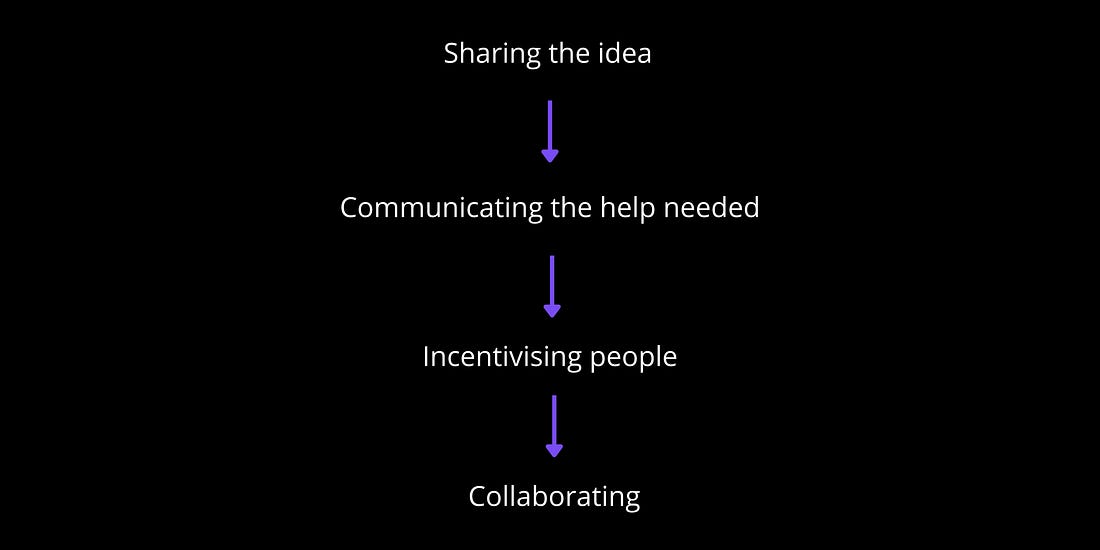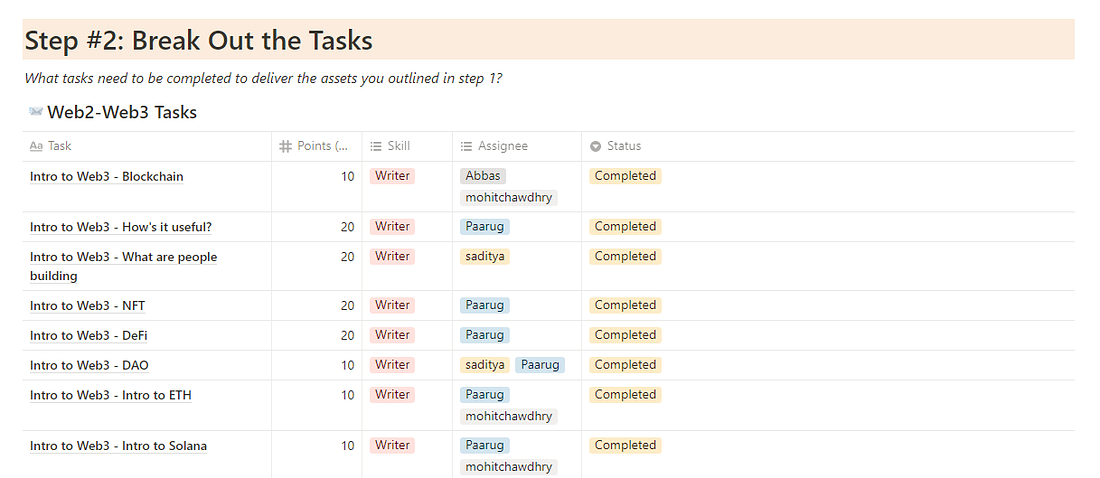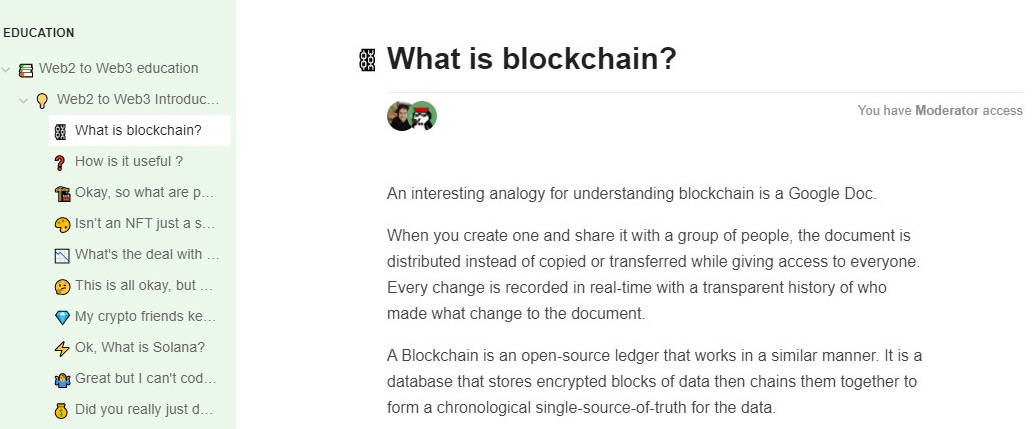DAOs are formed around consensus and solving common problems.
One such problem the Superteam DAO has set out to solve is how to onboard people working in web2 onto web3. This is what inspired the project Ground Zero, which is an attempt to provide a repository of resources and educational content to help convert the next generation of normies to full-time degens.
Education in Web3
A common mistake that’s very easy to make while thinking about this is to consider this shift as merely a technological upgrade. While partially true, the shift from web2 to web3 takes much more than that. It requires an update in our biological software as well - how we think about technology and the world at large.
A need for a shift in technology as well as our mental models around it results in a learning curve much steeper than one’s initial estimates. This was a common theme we found to be missing while researching about the education already out there.
Web3 is extremely well documented, but equally fragmented.
This is something we sought out to solve and the goal became to optimise for education but along with relevant context and not losing that human touch. The key here was to walk the fine line between “good understanding but not enough knowledge” and a complete “information overload”.
This led to the framework that we decided to follow for every domain we wanted to cover, courtesy of the brilliant Aditya Shetty, a fellow member at the Superteam DAO.
Setting up a framework
To start, the project had to be divided into a certain number of generalised domains relating to web3 allowing for following a top-down approach in the future when increasing the depth of information available.
Each topic/domain had to be covered through an arbitrary number of Buzzfeed-like questions that a normie (beginner) might ask while reading about that topic for the first time.
Since the North Star of any project is to optimise for shipping, we decided to limit the number of topics we cover for v1 of our project to three -
- Introduction to Web3
- NFTs
- DAOs
For every question (sub-topic) in each topic, the content was to be provided, and in a way limited to a short synopsis, a video, a blog/article and a tweet thread related to the sub-topic being discussed.
This served a couple of purposes:
- Learning about web3 is intimidating. When learning a new and novel topic, information overload is the last thing a person wants. The goal here is not to let someone know every single detail there is about a certain topic. Instead, it is to show them a glimpse of the rabbit hole they can enter and make them want to take the red pill.
- Curation > Creation. There’s a famous story in which a man, wanting to find a way to travel across the water, spent ten years learning how to walk on water. When he told Buddha about the great feat that he had achieved, the Buddha said, “Yeah, but the ferry only costs a nickel…". It is well-established that a lot of great content creators have provided all the material that someone would need to learn about web3. Curating it one place not only provides great content pieces but also introduces people to the leaders ideating in the space.
- Everyone has a different way of learning. The option to watch a video, dive deep into an article, or go through a tweet thread makes space for all kinds of learners out there.
Getting to Work
Probably the best feature of working in a DAO is the instant availability of help from a concentrated pool of talented individuals.
The scarcity of people is not the challenge anymore. Motivating, managing and rewarding are.
While different DAOs follow different mechanisms, we worked on the framework that most of Superteam DAO’s projects work on, courtesy of its brilliant sherpa Kash Dhanda along with a couple of hyper-talented members who came up with the Reputation System for members of the DAO. Kash wrote a great piece on how they built it here.
To tell a long story, in short, the flow that we ended up following involved sharing the idea, communicating the help needed, incentivising people to come on board, and finally collaborating on the project while also keeping track of the contribution proportionately.

Sharing the idea
A simple target of a deliverable within a limited timeframe optimising for quality and shipping over quantity and delay.

Communicating the help needed
We broke down bigger tasks into identifiable micro-tasks so people could “claim” them according to their proficiency as well as bandwidth. Very much in line with how a DAO is supposed to be.

Incentivising people
Each task was also accompanied by a certain number of XP points proportionate to the relative importance of that task in the overall project.
These points add up to each individual’s XP Points according to which, they are positioned in the DAO’s contributor’s leaderboard.
Collaborating on the Project
While initially using Notion, we shifted the workspace to BIP.so which allowed for open collaboration for every member in the DAO and made easy work of tracking contribution.

Fellow Superteam member Krishna eventually stepped up and exported the final iteration of the docs onto the Gitbook site that went public, which also allows open contribution from anyone out there.
Takeaways
Along with the unparalleled feeling of shipping a product, this project was also vital for me to identify some key takeaways for the upcoming iterations of Ground Zero, as well as collaborative projects in general.
Open-ended tasks do not work. Having learnt this the hard way, it’s safe to say that you’re not going to get much help if the task you need help on is clearly defined and well-communicated with context to the project you’re building. Specific, measurable tasks are what the human mind is drawn towards.
Efficiency vs. Size of a working group is a positively skewed bell-shaped curve. While it’s pretty clear that five people working together is better than two, it’s not necessarily the case that 10 is better than five. While attempting to take help from the larger audience of the DAO as well, it suddenly became very clear that communicating ideas and demands as well as considering and recording contributions become Herculean tasks in their own right. The optimal number of people should ideally be identified before even beginning to think about the tasks to be carried out.

Burning the boats makes things happen. The importance of setting a time frame for a project is one of the most underrated aspects of working on projects. A reasonable timeframe, if identified beforehand, drives a lot of action that would probably take a lot longer in the alternate scenario. We learnt this the hard way and had to bear the pain of late shipping as well.
This project has been an amazing learning experience for me and I hope to have it used by people to show it to their relatives so they can learn about this novel industry as well. We hope to make Ground Zero a much deeper, much more refined and much better-looking product than what it already is in the very near future.
A DAO is measured by its proof-of-shipping, amount of collaboration and the vibes in the community. Building products for the public to use is something that ticks all three of those boxes and therefore, with a robust reputation management framework in place, working at a DAO is most likely what the future of work, in general, is going to look like.
If you have any ideas around work, DAOs and web3 in general that you’d like to share and talk about, feel free to DM me at @paarugsethi on Twitter. Would love to chat and learn from any such conversation.
Also, a huge shoutout to the brilliant Kash, Aditya, Krishna, Raj, Naman, and other super talented members of the Superteam DAO that made shipping this project possible and will probably contribute to doing the same in the future as well.
Hope this was helpful. Thank you for reading. Until next time!